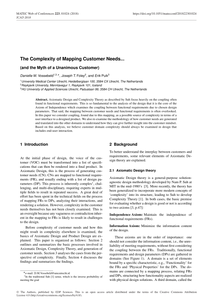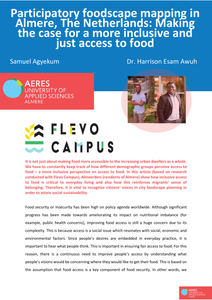From the article : "In this paper the implications of different research approaches and methods are illustrated by using two projects of the authors. Both projects take place in the same context: exploring participatory innovation within Small-to-Medium sized Enterprizes (SMEs). The main aspects coming forward when comparing the research characteristics of both projects are the importance of time and momentum, the structural set up of the project, people or participants and the abilities of the people involved. The research goal and the background of the researcher are main determinants for the chosen research methods. We hope with this paper to make researchers aware of the implications of the research methods and approach on the results of the project."
DOCUMENT

An increasing amount of cities are trying to increase civic engagement by using digital tools and platforms which gather data in a variety of ways on relevant topics within the city. Tools and platforms that focus on handling easy to fix issues on a local scale such as broken streetlights have been successfully implemented in cities already. In this paper a case study is described which aimed to retrieve data from citizens about a more complex local challenge in a neighborhood in Amsterdam. Furthermore, it has been investigated how the municipality could use the collected data as input for policy making. By making a participatory mapping mobile phone application available in a neighborhood, data was collected about places in the neighborhoods public space in which the citizens took pride and places that needed attention. This data is to be used as input for the area plan of the neighborhood. A first case-study with the application showed that even though there was low participation from the neighborhood, due to the high quality of the added data it was still valuable for the municipality.
DOCUMENT

From the article: "Axiomatic Design and Complexity Theory as described by Suh focus heavily on the coupling often found in functional requirements. This is so fundamental to the analysis of the design that it is the core of the Axiom of Independence which examines the coupling between functional requirements due to chosen design parameters. That said, the mapping between customer needs and functional requirements is often overlooked. In this paper we consider coupling, found due to this mapping, as a possible source of complexity in terms of a user interface to a designed product. We also re-examine the methodology of how customer needs are generated and translated into the other domains to understand how they can give further insight into the customer mindset. Based on this analysis, we believe customer domain complexity should always be examined in design that includes end-user interaction."
MULTIFILE

Improved cookstoves aimed at reducing exposure to indoor air pollution have had a lasting presence in development and health discussions. Through this article we contribute to current debates in the field by reflecting on our experiences during a cookstove participatory project in two ‘non-notified’ communities, or ‘slums,’ in Bangalore, India. We interrogate the alignment between some of the central tenets and methods of participation and the lived experiences of participating communities. The current predominant recommendations focus on developing and implementing cookstoves tailored for user needs. Yet, the project implementation entered a space of uncertainty where the priorities and needs of participants were diverse and changing. While urban infrastructures related to housing and work security, drainage systems, access to health care, and aspects of governance, citizenship and rights, may seem to fall outside the scope of ICS projects, our experiences show how inescapably they shape participatory processes and technologies. We highlight the need to take a closer look at how we can include these broader and changing priorities and needs in our methodologies and reflect on how we can better respond and align them with the ways in which people live.
MULTIFILE

It is not just about making food more accessible to the increasing urban dwellers as a whole. We have to constantly keep track of how different demographic groups perceive access to food – a more inclusive perspective on access to food. In this article (based on research conducted with Flevo Campus), Almeerders (residents of Almere) show how inclusive accessto food is critical to everyday living and also how this reinforces migrants’ sense of belonging. Therefore, it is vital to recognize citizens’ voices in city foodscape planning in order to attain social sustainability.
DOCUMENT

Designers move more and more in the direction of Service Design, in which frequently a participatory or co-design approach is used to involve service providers in the design process. The designerprovider relationship in such Service Design processes differs in four aspects from traditional client-relationships: The relationship is 1) more dynamic and interactive, 2) based on collaboratively evolving ideas and ambitions, 3) focusing on the process of innovation, rather than on the outcome, and 4) frequently based on extrinsic motivation for innovation or on fuzzy starting points. Designers experience difficulties in persuading service providers of the importance of such a collaborative approach, while providers are not familiar with this kind of approach and their organizations are not ready for such a kind of collaboration. This paper positions designer-provider relationship in Service Design processes in literature and describes a research proposal for the development of an efficient and effective participatory design intervention that stimulates collaboration between designers and service providers.
DOCUMENT

Patients with cardiovascular risk factors can reduce their risk of cardiovascular disease by increasing their physical activity and their physical fitness. According to the guidelines for cardiovascular risk management, health professionals should encourage their patients to engage in physical activity. In this paper, we provide insight regarding the systematic development of a Web-based intervention for both health professionals and patients with cardiovascular risk factors using the development method Intervention Mapping. The different steps of Intervention Mapping are described to open up the “black box” of Web-based intervention development and to support future Web-based intervention development.
LINK
Secondary school physical education (PE) teachers are continuously challenged to find ways to support students learning and motivate them for an active and healthy lifestyle. To address this complexity, continuing teacher professional development (TPD) is key. Technological tools can facilitate the effective delivery of TPD in this context. Successful implementation of this technology, however, is not self-evident. Based on the general aim of effectively integrating technologies in the educational process and focusing on the needs of educators, this study examines how the evidence-based theoretical TARGET framework for creating a motivating PE learning climate might be embedded into a digital professional development tool for PE teachers, useful in everyday practice. It presents a case study in which a multidisciplinary team of researchers, designers, and end-users iteratively went through several phases of need identification, idea generation, designing, development, and testing. By using a participatory approach, we were able to collect contextualized data and gain insights into users’ preferences, requirements, and ideas for designing and engaging with the tool. Based on these insights the TPD TARGET-tool for PE teachers was ultimately developed. The most prominent characteristics of this tool are (1) the combination of an evaluative function with teaching strategy support, (2) the strong emphasis on ease of use due to the complex PE teaching context, (3) the avoidance of social comparison, and suggestions of normative judgment, and (4) the allowance for a high level of customization and teacher autonomy.
DOCUMENT

Unhealthy lifestyle behaviours are common among vocational students and increase their risk of non-communicable diseases later in life. Unfortunately, only a limited number of school-based healthy lifestyle interventions have been developed for vocational students. Moreover, there is no evidence that these interventions are effective. They have often been developed by professionals without involving students and therefore may not align with the target group’s perceptions and needs. We used a participatory design approach to develop an intervention to promote healthy physical activity and dietary behaviours, in co-creation with vocational students. ‘Contextmapping’ was used to assess student conscious and subconscious motivation for a healthy lifestyle (n = 27, ages 17-26 years). All sessions and interviews were recorded and transcribed. The transcripts were analysed using framework analysis. Contextual characteristics that influenced student lives were their peers, family and short-term motives like earning money, being cool and looking good. In addition, they often had a passive attitude towards daily life, were unaware of their health illiteracy and being healthy was a goal for the distant future. These findings led to four design concepts that converged in a peer-led healthy lifestyle intervention that includes a social media campaign and activities to demonstrate and practice specific health behaviours among vocational students.
DOCUMENT

In urban planning, 3D modeling and virtual reality (VR) provide new means for involving citizens in the planning process. For municipal government, it is essential to know how effective these means are, to justify investments. In this study, we present a case of using VR in a municipal process of civic participation concerning the redesign of a public park. The process included codesign activities and involved citizens in decision-making through a ballot, using 3D-rendered versions of competing designs. In codesign, 3D-modeling tools were instrumental in empowering citizens to negotiate design decisions, to discuss the quality of designs with experts, and to collectively take decisions. This paper demonstrates that, in a ballot on competing designs with 1302 citizens, VR headsets proved to be equally effective compared to other display technologies in informing citizens during decision making. The results of an additional, controlled experiment indicate that VR headsets provide higher engagement and more vivid memories than viewing the designs on non-immersive displays. By integrating research into a municipal process, we contribute evidence of cognitive and engagement effects of using 3D modeling and immersive VR technologies to empower citizens in participatory urban planning. The case described in the paper concerns a public park; a similar approach could be applied to the design of public installations including media architecture.
DOCUMENT
